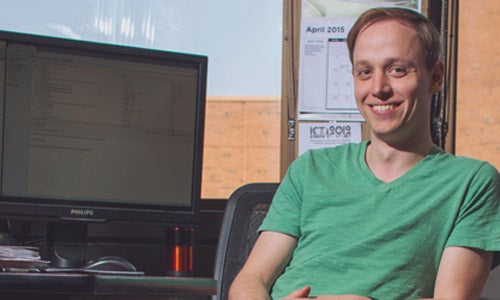
Psych scholar whose research gained global attention graduates
Gordon Pennycook published research on everything from BS to how smartphone use is linked to lazy thinking. Now he’s on a postdoctoral fellowship at Yale University

Gordon Pennycook published research on everything from BS to how smartphone use is linked to lazy thinking. Now he’s on a postdoctoral fellowship at Yale University
By Wendy Philpott Faculty of Arts
Gordon Pennycook is a psychology expert on how humans think, reason and make decisions. His passion for cognitive science may well be connected to his own extraordinary ability to think fast.
“Gord is a fast thinker, quick to make connections between ideas, and amazingly energetic in how rapidly he is able to conduct research and write papers,” said his academic co-supervisor Professor Derek Koehler. “He is also tremendously hard working and passionate about his research.”
Pennycook, who graduates this week with a doctorate in psychology from Waterloo, is currently at Yale University on a prestigious Banting postdoctoral fellowship. He will receive the Alumni Gold Medal for outstanding academic achievement at Waterloo’s 113th convocation ceremonies taking place on Friday October 21 and Saturday October 22.
The numerous studies he led and co-authored while a graduate student explore topics such as religious belief, moral judgments and values, creativity, smartphone use, health beliefs, science communication, and bullshit receptivity. The last of these studies, titled “On the reception and detection of pseudo-profound bullshit,” won a 2016 Ig Nobel Peace Prize, awarded to Pennycook and his co-authors just last month at Harvard University.
“We are not nearly as good at detecting bullshit as we think,” wrote Pennycook in a non-academic online publication.
The BS paper attracted plenty of media coverage and interviews, most recently on the current US election. “I've long been interested in political and religious history and, naturally, I care about current affairs. So, I investigate the weaknesses of human reasoning so that we can (maybe) someday improve.”
Another paper that Pennycook co-authored with Nathaniel Barr, then a postdoctoral fellow at Waterloo, titled “The brain in your pocket: Evidence that Smartphones are used to supplant thinking,” was covered by more than 700 media outlets worldwide.
“I'm motivated by curiosity, to be perfectly honest,” says Pennycook. “I’m most fascinated with the weakness of human reasoning. My supervisors Jonathan Fugelsang and Derek Koehler allowed and encouraged me to follow my interests, which is how I fell in love with cognitive science. We make a great research team.”
His PhD research focused on reasoning and decision-making, examining factors that determine when an individual will think analytically or rely on their intuition.
“Supervising Gord was like having a senior post doc in the lab. I am convinced I learned more from him then he did from me,” said Professor Fugelsang. “He single-handedly infused a whole new level of theoretical depth and topical breadth to the work in our lab.”
No wonder he was ranked #1 by SSHRC among the 2016 Banting postdoctoral recipients.
At Yale, Pennycook is continuing his research on the interplay between intuition and reflection. “I feel incredibly fortunate to be able to be in a position to actually do empirical studies on things that I find interesting.”

Read more
Meet five exceptional Waterloo graduate students crossing the convocation stage as Class of 2025 valedictorians

Read more
The medal honours outstanding individuals across Canada who have made significant contributions to their communities

Read more
Waterloo welcomes emerging postdoctoral scholars to receive funding from Provost fellowship programs
The University of Waterloo acknowledges that much of our work takes place on the traditional territory of the Neutral, Anishinaabeg, and Haudenosaunee peoples. Our main campus is situated on the Haldimand Tract, the land granted to the Six Nations that includes six miles on each side of the Grand River. Our active work toward reconciliation takes place across our campuses through research, learning, teaching, and community building, and is co-ordinated within the Office of Indigenous Relations.